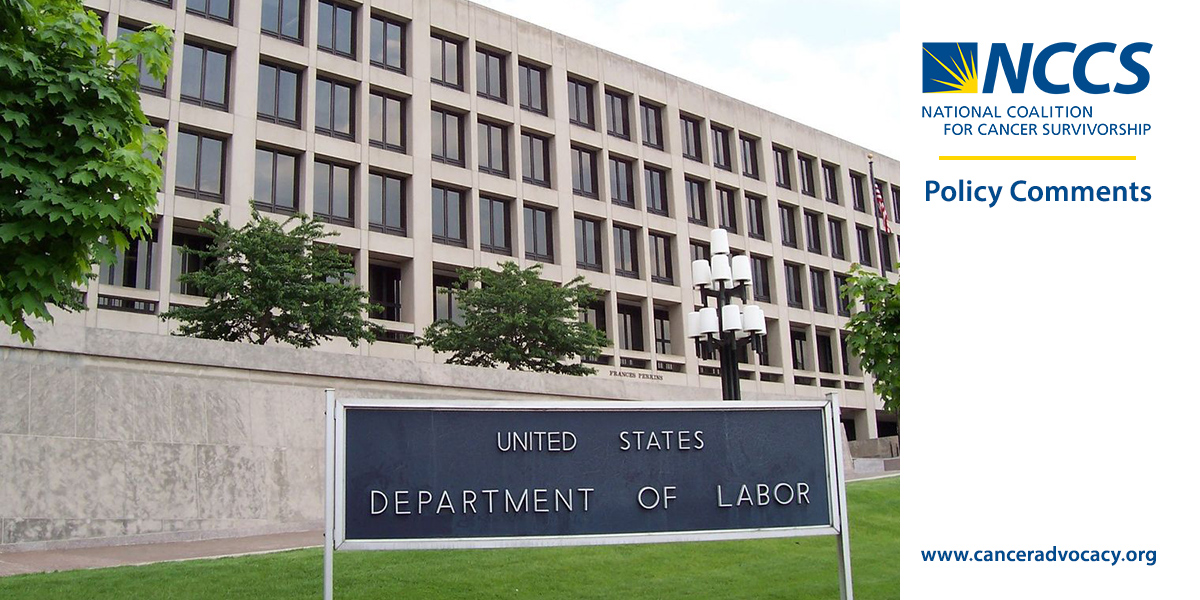NCCS Letter to DOL: Proposed Association Health Plans Rule “Will Increase Costs for Cancer Survivors and Others with Significant Health Needs”

The National Coalition for Cancer Survivorship (NCCS) submitted comments on the proposed rule on Association Health Plans (AHPs) and expressed serious reservations that the proposed rule will weaken the individual and small group markets that provide health insurance coverage to many Americans with a history of cancer.
For those who now receive their insurance through AHPs, cost of coverage may be reduced. However, the coverage offered in AHPs may well be inadequate for all but those with near-perfect health. Cancer patients will likely find that AHP coverage will not meet their care needs.
NCCS believes that the proposed rule on AHPs fails to honor the goals of the Executive Order to improve coverage and affordability of health insurance for Americans. The proposed rule, if finalized as drafted, would also leave consumers at risk of fraudulent and insolvent AHPs. The action that would be in the interest of American health care consumers would be the withdrawal of the proposed rule and a reconsideration of the standards for AHPs to ensure that coverage through AHPs meets the standards and protections of the Affordable Care Act (ACA).
Read the full letter below.

March 6, 2018
The Honorable R. Alexander Acosta
Secretary
Department of Labor
200 Constitution Avenue, NW
Washington, DC 20210
Re: Definition of Employer Under Section 3(5) of ERISA – Association Health Plans (RIN 1210-AB85)
Dear Secretary Acosta:
The National Coalition for Cancer Survivorship (NCCS), a national organization representing survivors of all types of cancer in efforts to protect access to quality cancer care for all, appreciates the opportunity to comment on the proposed rule on Association Health Plans (AHPs).
We have serious reservations that the proposed rule will weaken the individual and small group markets that provide health insurance coverage to many Americans with a history of cancer. For those who now receive their insurance through AHPs, cost of coverage may be reduced. However, the coverage offered in AHPs may well be inadequate for any but those with near-perfect health. Cancer patients will likely find that AHP coverage will not meet their care needs.
The Department of Labor has undertaken this effort to revise the regulations governing AHPs consistent with the Executive Order of fall 2017, which urged several departments to take action to expand the range and address the affordability of health plan choices for Americans. The proposed rule falls short of that aim, as it will increase costs for cancer survivors and others with significant health care needs who rely on the individual and small group markets. Moreover, cancer patients and others with serious and life-threatening illnesses who receive coverage through AHPs may find their coverage to be inadequate. On the critical measure of protecting Americans’ access to adequate and affordable insurance coverage, the proposed rule falls short. In fact, it moves the health insurance system in the wrong direction on both counts.
Coverage and Affordability in AHPs
The proposed rule would permit AHPs to be considered a multi-employer plan under the Employee Retirement Security Act of 1974 (ERISA). The so-called “look through” doctrine established in a 2011 Centers for Medicare & Medicaid Services (CMS) guidance subjects AHPs sold to individuals and small groups to the Affordable Care Act (ACA) requirements and consumer protections. If the proposed rule is finalized, the “look- through” doctrine would no longer apply.
Under the proposed rule, AHP coverage would no longer be subject to essential health benefit requirements. Based on past experience with AHP coverage, we anticipate that maternity care, prescription drug coverage, and mental health coverage would be among the benefits that might be at risk in AHP plans. For people with cancer, the elimination of the prescription drug coverage would make AHP coverage wholly inadequate, as drugs are typically part of multi-disciplinary cancer care.
Although the proposed rule prevents AHPs from undertaking health status rating of separate employers, the rule would appear to allow groups or associations to base premium rates on other factors, including gender, age, industry, and other factors that estimate health care utilization. Small businesses that have employees who are older, disproportionately women, or likely to be high health care utilizers might be subject to higher premiums. These increased premiums would be passed along to individual consumers.
The proposed rule would apply the HIPAA nondiscrimination provisions to AHPs. Although we applaud this provision of the proposed rule, we note that AHPs can engage in a variety of actions that will result in discrimination against people with significant health needs. As discussed above, AHPs will have flexibility in establishing premium rates and in benefit design, and this power with regard to premiums and benefit design will result in discouraging people with significant health needs from enrolling in AHPS and will result in healthier groups enrolling in AHP coverage. Discrimination against those with significant health needs will be accomplished in spite of the HIPAA protections.
The proposed rule may lead to AHP coverage that is affordable for young and healthy Americans. However, even those consumers will find their coverage inadequate if they encounter any health issues, including a cancer diagnosis, during the plan year. For those consumers who have health conditions that require treatment, the affordability of coverage will be of little comfort if the coverage is wholly inadequate.
The solution to these problems of affordability and adequacy of coverage would be to retain the “look-through” doctrine if the AHP is offering coverage to individuals and small employers. This would ensure that ACA protections remain in place for AHPs for these populations.
Notification of Consumers Regarding Minimum Value
The Departments requests information about required notices to consumers in AHPs. We urge that AHPs be required to provide notice to employer groups and possible beneficiaries regarding the plans offered and whether they meet standards for minimum value. The notices should also advise beneficiaries that, if plans do not meet minimum value standards, they have a right to receive coverage through the health insurance marketplaces and they may also be eligible for premium assistance.
We recommend that employer groups and potential beneficiaries be notified that AHPs do not cover certain essential health benefits. They should also be notified of appeal rights, summary of benefits and coverage, and summary plan descriptions.
Disruption of the Individual and Small Group Markets
We are concerned that the coverage that is offered through AHPs will be inadequate for all but the healthiest Americans. Many individuals are healthy and without health care needs until the moment of their diagnosis with cancer. As a result, we are concerned about the exposure to significant health care costs that will result from AHPs.
Despite our misgivings about the inadequacy of AHP coverage, both because of limited benefits and significant cost-sharing requirements, we believe these plans will be aggressively marketed and purchased by younger and healthier Americans. This will result in market segmentation and a risk pool in the individual and small group markets of older Americans who are above average utilizers of health care. For cancer patients who rely on coverage through the individual and small group markets, premiums will increase and adequate coverage may be beyond their reach.
Retain Standards and Regulatory Authority that Prevent Fraud in AHPs
We recommend that the commonality of interest test be retained for AHPs. The commonality of interest test requires employers participating in an AHP to show a commonality of interest and prevents them from forming an AHP solely for the purpose of offering insurance. The commonality of interest test has been one of the protections against AHPs that commit fraud and experience financial insolvency. This test is one means of protecting consumers from purchasing coverage that is fraudulent or purchasing from an entity that goes bankrupt in the middle of a benefit year.
The proposed rule goes aggressively in the opposite direction, by encouraging employers to form associations SOLELY for the purpose of offering health insurance. The proposed rule is also unclear on the preemption of state law. We urge that the Department clarify that those entities considered single employer AHPs would have to comply with laws in the states in which they operate and continue to be subject to state oversight and regulation. Retaining state authority would help protect consumers from AHPs that are fraudulent or insolvent.
NCCS believes that the proposed rule on AHPs fails to honor the goals of the Executive Order to improve coverage and affordability of health insurance for Americans. The proposed rule, if finalized as drafted, would also leave consumers at risk of fraudulent and insolvent AHPs. The action that would be in the interest of American health care consumers would be the withdrawal of the proposed rule and a reconsideration of the standards for AHPs. This reconsideration should result in a proposal ensuring that coverage through AHPs meets the standards and protections of the ACA.
Sincerely,

Shelley Fuld Nasso, MPP
Chief Executive Officer
Read more NCCS Policy Comments »



